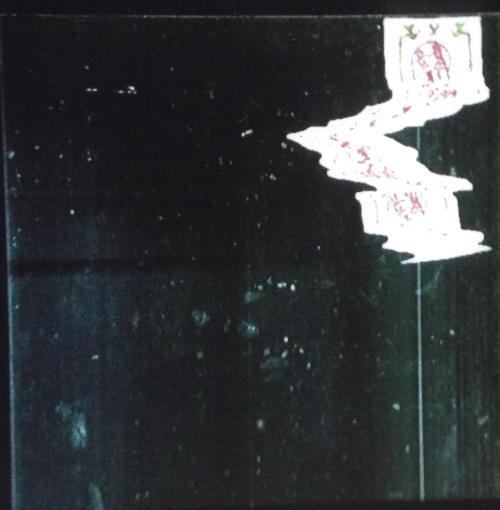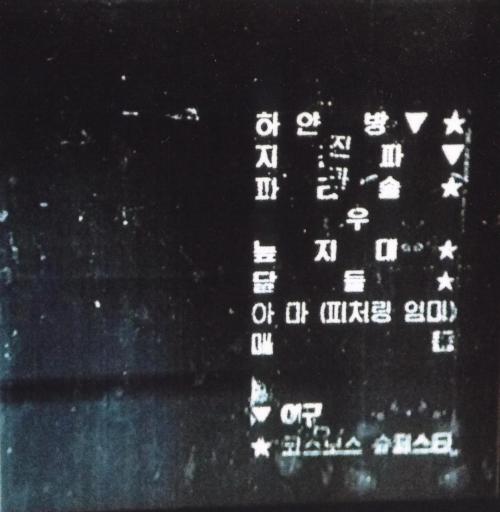Mid-Air Thief (aka Gongjoong Doduk, Public Morality, Bird’s Eye Batang) released his excellent debut album in 2015. It was also released in Japan by Botanical House in 2017, and this interview was conducted on that occasion by Someya Taiyo (who you might know from Lamp). Interviews with Mid-Air Thief are scarce at best so this is a rare treat.
Enjoy!
Interview & text: Someya Taiyo (Japanese text)
English translation: Henkka
Mid-Air Thief on the web: BandCamp
Not only does Public Morality easily transcend the Korean indie scene, it transcends our entire era itself. In it, I feel something that shines among the overall history of all popular music worldwide.
While I’d had a sense of the Korean indie scene gaining momentum since the mid-00’s, I had never really heard anything that left much of an impact on me personally. But when I heard this, I just thought, “Wait, this is from Korea?!” With that said, it might be that Mid-Air Thief is not so much related to the country’s “scene” or some such—he’s just one miraculous musician who happened to have been born in South Korea.
Even in South Korea the name “Mid-Air Thief” is still shrouded in mystery. Surely there is so much that people want to know and ask about the artist, so I believe this interview will be of much value.
— How satisfied with the album are you now that it is finished? How do you feel about it now?
Mid-Air Thief: I gave it a listen when it was released, and I couldn’t believe how fast the tempo on some of the songs was. As I was making it I thought the tempo was just right, but now I have no idea what I was even thinking during the recordings. (laughs)
— When did you first think of the concept for Public Morality?
Mid-Air Thief: I’d always wanted to play in a band with someone, but I could never find like-minded individuals. Thus, I decided to do it all on my own. Then I just started writing songs and recording right away, thinking about the general framework and atmosphere I wanted to create.
I had a plan for the Public Morality project, but it kept constantly changing as I was working on it. That was probably due to me working on the album at home without any predetermined time limit or deadline. Whether that was a good thing or not, I don’t know.
— How long did you work on the production of this album, recording and all?
Mid-Air Thief: It was about four or five months, starting in mid-2014.
— What sort of an environment did you record this album in? What kind of equipment did you use?
Mid-Air Thief: I did over half of it at home. Right now I live below ground in a shopping district, so no one minds loud noises regardless of the time of day.
Equipment-wise, I didn’t use anything special. I tried things like recording on a reel tape recorder, or on the computer and then sending the data to tape afterwards, but I couldn’t get the kind of warm, analog tape sound like on all my favorite albums. At the time I was kind of hooked on taking tracks I’d already recorded and redoing them through a guitar pedal. That’s something I did quite a lot.
Also, one time I was visiting my parents’ home for a couple of days which is when I tried using a portable recorder. I liked the sound of it so much that even once I got back home I still preferred using that over any other mics.
— Am I right to assume that this album was for the most part created by you alone? Was there anyone else involved in the musical creation, and if so, in what role?
Mid-Air Thief: I’m really not very good at all at writing lyrics, so I had two people help me with that. Ms. Gyu wrote the lyrics to “White Room” and “Swamp,” and Cosmos Superstar wrote the lyrics for “Parasol.” Both of them also sang some parts.
Also, when I was visiting back home my mother was practicing the clarinet so I tried putting some of her playing in one of the songs, but then I got embarrassed and hid it in mixing. (laughs)
— One thing that strikes me throughout the album is how sharp your playing is on the classical and acoustic guitar. It’s great. How did you go about developing your guitar technique?
Mid-Air Thief: Thank you. I’m by no means talented though. Middle and high school was the time I was playing guitar the most, but rather than lessons I mostly learned by looking up tabs on the net and playing them on my own.
I had a jazz guitar teacher, but I didn’t like him very much. We did 40-minute lessons where he would come in five minutes late and end five minutes early so he could go out for a smoke. Still, I kept taking lessons from him over several years. Looking back I have no idea why I didn’t think to change teachers.
— On this album I’m especially fond of the pitch changes and fluctuations, along with the appearance of pitches outside of the twelve-tone scale. What sort of equipment do you use to control pitch? What is your favorite equipment for doing that, and what kinds of techniques do you employ?
Mid-Air Thief: One of my main reasons for buying a reel deck was… I think it’s called “wobble”? I prefer a kind of vibrato that doesn’t sound mechanical, but sometimes it would get too intense, too fast, or it would lose its vibrato entirely, so I recorded things over and over again to try and get just the right sound. I tried stretching out the tape path very long, and that gave me the best results. I also tried using lots of TC vibrato pedals. I’ve never managed to find even one software plug-in that I like as much.
— One can hear various different instruments on the album. What instruments do you play outside of the guitar, and when did you start playing said instruments?
Mid-Air Thief: I’ve never learned anything aside from the guitar. I only know a tiny bit about other instruments—I’ve never studied them and I have no idea how to play them properly. I’m just using them entirely as I please. (laughs)
— I’m very curious to know about the foundations of how this kind of music came to be in the first place. Please tell us about musicians who influenced you, or about musicians you like in general.
Mid-Air Thief: I saw Sonnymoon live seven years ago, and that was an experience I still can’t forget. I was invited to go see them by a friend without even knowing who they were, but after their show I kept listening to them constantly. Their vocalist, Anna Wise, has a great voice and she’s a terrific singer.
There’s lots of musicians who I like and who influenced me. Hoegidong Danpyunsun is someone I like in many ways, not just for his music. This album called 100 Years that he did by himself has songs on it that are so beautiful it hurts (especially “Tortoise Ritual,” “100 Years,” and “Purifier.“)
— The album also features lots of vocal harmonies, all of them arranged in a very effective way. Furthermore, it’s very interesting hearing the unpredictable and inventive chord progressions featured throughout the material. In that respect, what kinds of artists were you paying special attention to, or what music would you recommend listeners to check out?
Mid-Air Thief: Gary Wilson‘s albums, the recent album that Deerhoof and Ensemble Dal Niente did together, Kaki King‘s Everybody Loves You—all of that stuff is tasteful and interesting, with all of them having their respective appeal about them. I’ve also been listening to the music of Harry Partch recently, and it sounds so fresh. I heard he actually makes his own instruments. It’s just so unique.
— Throughout the album one gets the impression that there is also a constant noise or some other sound present, apart from the actual music. What were your thoughts there?
Mid-Air Thief: Right. The DBX noise reduction on my reel deck broke, so I figured if I was going to have noise on the recordings anyway I might as well have it be a part of the texture. I tried to get all kinds of different noise in there on purpose.
— I understand you usually work under a different name, making completely different kind of music. What was the impetus for starting to create music as “Public Morality,” and what were your intentions with it?
Mid-Air Thief: Some years ago I was doing electronic music, but I wasn’t a huge fan of it and musically it’s totally different to what I’m doing now, so I changed names. I made both the name and the album title “Public Morality” because I figured it’d be funny how difficult it would be to look it up. Turns out it wasn’t really funny at all. Although just recently there was a hip hop group also by the name of Public Morality, so maybe it’s finally starting to be a little bit funny.
— While musically this album is nearing perfection, to me even just the songs and their melodies alone stand out for how great they are. Even if one was to mute all of the tracks aside from the guitar and your vocals, I believe it would still sound like great music. What kinds of things are you especially conscious of when making music?
Mid-Air Thief: When I’m making an album, the thing I’m the most conscious of is the listener. For the most part I make music for my own enjoyment, but when I’m making music that’s meant to be released to the general public, I don’t really enjoy it to that extent. I’m always thinking about stuff like whether or not listeners will like what I’m making; whether or not it’s something they can concentrate on and listen to for a long time. I’ve become unable to tell whether I’m making music for the people listening, or because I actually want to.
Aside from all that, I think about the balance and the feel of the album as a whole.
— In regards to the arrangements, is it more that you mostly arrange the songs as you’re writing them, or do you just record what you have and then gradually add layers on top of that?
Mid-Air Thief: Sometimes I might have an idea for the entire arrangement beforehand and I’ll start recording only after I’ve finished arranging, but with most songs I’ll just record as I’m making the song and arrange it on the fly. That’s why I don’t have any demos—I’ll add new sounds on top of what I recorded previously, and then I just keep repeating the process over and over again.
— I do believe Public Morality to be totally unique—one could not find another album like it anywhere in the world. Was it your intention to try and create something that had never been made before?
Mid-Air Thief: Thank you. However, there’s lots of music like this out there. I’d listened to a lot of Western music and so I was conscious about trying to create something with a more oriental color, but I wasn’t at all thinking about trying to create something that’s never been done before.
This might not be entirely related, but I once heard how Bobby McFerrin was trying to find a voice that was totally original to him, and so he went two years without listening to anyone else’s vocals. While that is cool and I do think it’s an incredible achievement, it also sounds so stressful. I mean, the world is full of so many great voices; so much great music…
— If you were to describe your musical talent, where would you say it lies?
Mid-Air Thief: In me listening to lots of good music.
— What are your interests outside of music?
Mid-Air Thief: I quite like mountain climbing and cycling, and I enjoy watching people and kids who are good at cooking.
— Your album is now getting an official release in Japan. How do you feel about your music reaching and being heard even in countries outside of South Korea?
Mid-Air Thief: I’m very happy about the Japanese release. Since the lyrics are all in Korean, I’m actually glad that listeners will be focusing on my voice over any other aspect. While I’m not sure when it might happen, I’d like to put out some new music, put a band together, and play in Japan. Even if just once.
— I understand that you haven’t been active with this artist name at all since releasing this album in 2015. However, for us fans who have heard this album, we can’t help but look forward to your second album, too. Please tell us about your future plans.
Mid-Air Thief: Now that there’s that hip hop group also by the name of Public Morality, I think I might have to change names once more. Either that, or I give a shot at rapping myself.
Right now I’m writing these super laid-back songs with a singer friend of mine as well as a drummer, and whenever I have the free time I’m also making this spoken word album together with some actors. I should be able to release two albums this year.
Thank you so much for listening to my music and making it so that it could be released in Japan!
— Thank you very much.



